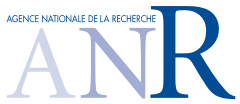

 Programme
blanc N° ANR-08-BLAN-0317-01/02
Programme
blanc N° ANR-08-BLAN-0317-01/02Workshop at ENS Paris
Topic: Moduli spaces of meromorphic connections
Date and duration:
September 21-22, 2010
Where?: ENS Paris, 45 rue
d'Ulm, salle W
Organizers: Phil Boalch,
Claude Sabbah & Carlos Simpson
Contacts:
Program:
Tuesday,
September 21
9h30-10h30
Phil Boalch
(CNRS, ENS Paris):
Simply-laced isomonodromy systems
Abstract:
10h30-11h
Coffee
11h-12h
Masa-Hiko
Saito (Kobe):
The moduli spaces of stable parabolic
\(\lambda\)-connections and their canonical coordinates
(Joint works with M. Inaba and with S. Szabo)
Abstract:
We will construct algebraic moduli spaces of stable parabolic
\(\lambda\)-connections with regular and irregular singularities (with
generic conditions). The moduli spaces are smooth over natural
spaces of
generalized exponents and have natural symplectic structures
via deformation theory. Then we will introduce canonical
coordinates for
Zariski open sets of the moduli spaces in a conceptual way.
12h-14h
Lunch
14h-15h
Daisuke
Yamakawa (ANR SÉDIGA, ENS Paris):
Generalization of Harnad's
correspondence and middle convolution
Abstract:
The middle convolution introduced by Katz is an interesting operation
on local systems over a punctured projective line.
Recently, it has been generalized to an operation on
irregular singular connections by Arinkin.
In this talk, I give a purely algebraic analogue of Arinkin's
generalization,
which may be viewed as a natural generalization of
Dettweiler-Reiter's additive description of the middle convolution.
Key tools are the relation between the middle convolution
and the Harnad duality observed by Boalch,
and Mumford's geometric invariant theory for representations of
quivers.
15h15-16h15
Damien
Mégy (ANR SÉDIGA, Nice):
Some examples of variation of Hodge
structure over projective varieties
Abstract:
I will introduce examples of variation of Hodge structure over some
smooth projective varieties, give an outline of the construction of
such varieties, and explain how to use Morihiko Saito's decomposition
theorem to compute certain cohomological invariants of these objects.
16h15-16h45
Coffee
16h45-17h45
Carlos Simpson
(CNRS, Nice):
Foliations on moduli spaces of
regular connections
Abstract: We look at a
natural family of Lagrangian subspaces of the moduli space of regular
connections, in particular in the case of the projective line minus
four points corresponding to Painlevé VI. Iwasaki-Inaba-Saito as
well as Szabo have given explicit constructions, which we compare with
the abstract definition using the nonabelian Hodge filtration. This
allows us to see that the subspaces form a foliation in this case, the
quotient of which has appeared in work by Arinkin on the Langlands
program.
For a related result, see D. Arinkin and R. Fedorov, An example of
Langlands correspondence for irregular rank two connections on \(\mathbb P^1\),
on arXiv: 1003.6112.
Wedneseday,
September 22
9h30-10h30
Phil Boalch
(CNRS, ENS Paris):
Quasi-Hamiltonian geometry of
irregular connections on curves
Abstract:
10h30-11h
Coffee
11h-12h
Michael
Dettweiler (Heidelberg):
Hodge filtration and potential
automorphy of \(G_2\)-motives
Abstract:
Using recent automorphy criteria of Richard Taylor and his
collaborators and joint work (in progress) with Claude Sabbah we derive
potential automorphy for certain motives with motivic Galois group \(G_2\).
12h-14h
Lunch
14h-15h
Daisuke
Yamakawa (ANR SÉDIGA, ENS Paris):
Generalized middle convolution and
non-simply-laced root systems
Abstract:
It was observed by Crawley-Boevey that middle convolutions and
some trivial operations generate Weyl symmetry groups of
the moduli spaces of local systems on a punctured projective line.
This talk treats the case of irregular singular connections.
The symmetry groups induced from generalized middle convolutions
are complicated in general. However, in some special cases,
they become Weyl groups of some non-simply-laced root systems.
15h15-16h15
Szilard Szabo
(Budapest):
Canonical coordinates on the de Rham moduli space over P1
Abstract:
We show how the canonical coordinates determine uniquely
a differential equation in the case where all the Fuchsian weights
are equal to 1, and comment on the generalisation (ongoing joint work
with Masa-Hiko Saito) to equations with apparent singularities of
higher weight.
16h15-16h45
Coffee
16h45-17h45
Claude Sabbah (CNRS, École polytechnique): Rigidity and irregular singularities, after Deligne & Arinkin, pdf
Abstract: I will show the existence of a Katz algorithm which reduces a rigid irreducible meromorphic bundle with connection to a rank one bundle with connection, through middle convolutions as in the regular singularity case, and Fourier transforms.